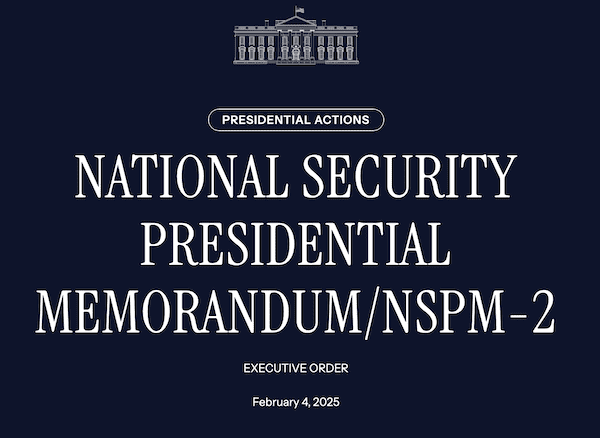On February 4, 2025, the White House issued National Security Presidential Memorandum 2 (NSPM-2), a sweeping executive order that signals a dramatic escalation in U.S. policy toward Iran. This comprehensive directive, which declares Iran “the world’s leading state sponsor of terror,” outlines an aggressive “maximum pressure” campaign that could have far-reaching consequences for both international stability and American security.
Understanding the Context
The memorandum emerges against a backdrop of heightened tensions, citing Iran’s alleged involvement in the October 7, 2023 Hamas attacks and subsequent missile demonstrations against Israel in April 2024. According to the document, Iran “remains the world’s leading state sponsor of terror and has aided Hezbollah, Hamas, the Houthis, the Taliban, al-Qa’ida, and other terrorist networks.”
However, as noted in the detailed analysis provided, this characterization demands careful scrutiny. While U.S. intelligence has long maintained this position, independent analyses from organizations like the International Crisis Group suggest a more nuanced reality. The memorandum’s language, particularly its use of terms like “nuclear extortion racket” and “existential danger,” appears designed to rally support for aggressive action rather than promote diplomatic solutions.
Key Policy Directives and Their Implications
Economic Impact
The order mandates the Treasury Department to:
- “Immediately impose sanctions or appropriate enforcement remedies on all persons for which the Department has evidence of activity in violation of one or more Iran-related sanctions”
- “Implement a robust and continual sanctions enforcement campaign”
- Review and potentially rescind any economic relief measures
These directives could significantly impact global markets and American businesses, particularly in sectors like shipping, insurance, and international trade. The requirement for financial institutions to potentially adopt a “Know Your Customer’s Customer” standard for Iran-related transactions could create substantial compliance burdens.
Security Concerns
Perhaps most concerning for American citizens is the memorandum’s assertion that “The Iranian Government, including the IRGC, is using agents and cyber-enabled means to target United States nationals living in the United States and other countries around the world for attacks, including assault, kidnapping, and murder.”
This claim, while serious, lacks detailed public evidence in the document. The memorandum’s emphasis on these threats, without providing concrete verification, raises questions about the balance between security measures and potential fear-mongering.
Critical Analysis of the Language
The document’s rhetoric deserves particular attention. As noted in the analysis, it employs several propaganda techniques:
- Emotional manipulation through urgent, threat-focused language
- Selective attribution of complex regional events solely to Iranian actions
- One-sided presentation that omits alternative diplomatic approaches
The memorandum’s characterization of Iran’s nuclear program as an “existential danger to the United States and the entire civilized world” exemplifies this approach. While concerns about nuclear proliferation are legitimate, such absolute language could make diplomatic solutions more difficult to achieve.
Impact on American Communities
The implementation of NSPM-2 could affect American communities in several ways:
Economic Effects
- Increased compliance costs for businesses engaged in international trade
- Potential disruption of global supply chains
- Higher energy costs if oil markets are destabilized
Security Implications
- Enhanced surveillance and monitoring of Iranian-American communities
- Potential increase in discrimination and profiling
- Cybersecurity concerns for critical infrastructure
Diplomatic Consequences
- Reduced opportunities for cultural exchange
- Increased tension in communities with significant Iranian-American populations
- Potential backlash against U.S. citizens abroad
Actionable Steps for Citizens
Given these implications, here are concrete steps Americans can take:
For Business Leaders
- Review and update compliance programs to ensure adherence to new sanctions
- Assess supply chain exposure to Iranian-linked entities
- Implement enhanced cybersecurity measures
For Community Members
- Stay informed through diverse news sources, including international perspectives
- Engage with local representatives about the impact of these policies
- Support organizations promoting diplomatic solutions and cross-cultural understanding
For Activists and Advocates
- Monitor implementation of the order for potential civil rights violations
- Document and report instances of discrimination or profiling
- Advocate for balanced approaches that consider both security and diplomatic solutions
Conclusion
NSPM-2 represents a significant escalation in U.S.-Iran relations that warrants careful attention from all Americans. While the memorandum’s stated goal of preventing nuclear proliferation is legitimate, its aggressive language and broad scope could have unintended consequences for both international stability and domestic security.
The document’s reliance on emotional language and selective presentation of evidence, as identified in the analysis, suggests a need for citizens to remain critically engaged with its implementation. As noted by independent analysts, “maximum pressure” policies can lead to unintended consequences, including increased regional instability and anti-American sentiment.
Moving forward, it will be crucial for Americans to balance legitimate security concerns with the need for diplomatic solutions that can promote long-term stability. This requires staying informed, engaging with diverse perspectives, and actively participating in the democratic process to ensure that implementation of these policies serves both our security interests and our democratic values.
For more information and updates on this developing situation, consult reports from the International Atomic Energy Agency (IAEA), independent think tanks like the International Crisis Group, and respected news sources such as Reuters and The Associated Press.
This analysis is based on official White House documentation and independent research. The situation continues to evolve, and readers are encouraged to consult multiple sources for the latest developments.


